The many versions of "Anna and the King of Siam"
 Sunday, June 20, 2021 at 4:47PM
Sunday, June 20, 2021 at 4:47PM 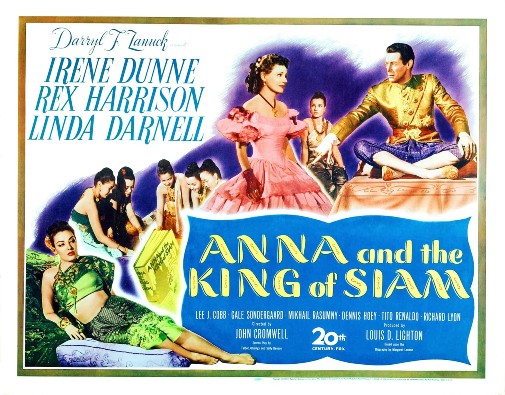
Seventy-five years ago, Anna and the King of Siam premiered in theaters. The film was adapted from a book by the same name, which purported to present a fictionalized, yet historically-based, account of the years spent by Anna Leonowens in the court of King Mongkut of Siam - present-day Thailand - in the 1860s. Novelist Margaret Landon based her work on Leonowens' memoirs, creating a window into an otherworld that dazzled readers and moviegoers of the 1940s. Over the years, the story's popularity persisted, and it has been retold in several different mediums. On the anniversary of its first cinematic adaptation, let's look at the four movie versions from the Oscar-winning costume drama to a forgotten animated catastrophe…
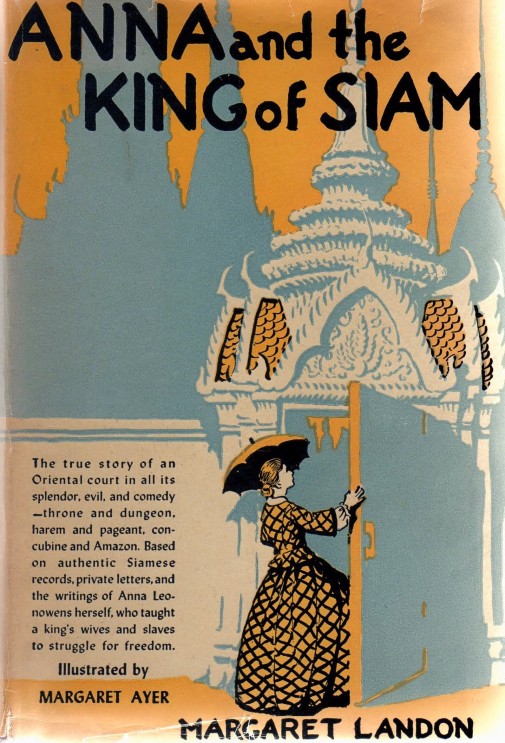
First things first – when exploring the cultural depictions of Anna Leonowens' life, one should acknowledge how her memoirs have been controversial from the moment of their publication. The Indian-born British woman was one among a long list of tutors who educated King Mongkut's children. While it's true that, upon his death, the monarch's will acknowledged both the teacher and her son, Louis, Leonowen's political influence and closeness to the family are debatable. Many have accused the teacher of presenting herself as much more important than she was, twisting the facts to be more heroic and to represent Siam according to Western prejudices about the uncolonized Asian nation.
Media depictions of her tale have always centered Leonowens' perspective, adopting a British Imperial point-of-view even when clumsily trying to criticize colonialism and painting the Siamese people as an "other" that needs to be saved by a forward-thinking foreigner. Beyond matters of historical accuracy or political responsibility, these depictions of 19th century Siam tend to flatten every character other than Anna Leonowens into either a stereotype, an archetype, or a barely sketched entity. As for the specificity of Siamese culture, it's no more than exotic set dressing, forever unexamined and just there to look pretty.
Still, some pieces of popular entertainment about Anna and the King are better than others. In 1951, Rodgers and Hammerstein adapted Landon's novel into a musical whose legacy and crowd-pleasing reputation are robust to this day. Just five years ago, a Broadway revival won four Tony awards, including a Best Actress trophy for Kelli O'Hara in the role of Anna. She was the third actress to win that prize for the part. Gertrude Lawrence triumphed in the original production, and Donna Murphy snagged the Tony for the 1996 revival. There was also a short-lived TV show where Yul Brynner reprised the role of King he had originated on stage. However, the 1972 series was more of a sitcom than an opulent musical, featuring no songs.
With that out of the way, it's time to look at the four "major" motion pictures made out of Leonowens' life in Siam:
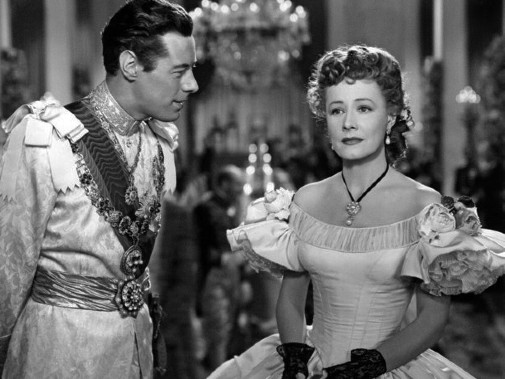
ANNA AND THE KING OF SIAM (1946)
The Margaret Landon novel was such a success in America that it was only a matter of time before Hollywood turned it into a movie. Twentieth Century Fox producer Darryl Zanuck supposedly marveled at the comedic possibilities of the story, the clash of cultures tempered by personal drama, tenderness, and conflict. Knowing Zanuck's opinion of the novel certainly helps explain the strange tonalities of 1946's Anna and the King of Siam. While I appreciate the avoidance of romantic undertones there is something unsettling about the jesting attitude that consumes a lot of this flick.
I say this because Rex Harrison's portrayal of King Mongkut is uncomfortably mocking, turning such major set pieces as the banquet for foreign dignitaries into a bumbling procession of awkward misdeeds. Yet, despite his propensity for clownery, he's oddly cold in his imperiousness, making the relationship at the center of the picture even more unbalanced than it already was. Taking on the role of Anna, Irene Dunne offers necessary contrast, finding heartfelt emotion under the layers of misshapen crinolines and British archness. The rest of the cast do what they can, most of them in yellowface, but Gale Sondergaard was the only actor to secure herself an Oscar nomination.
The black-and-white cinematography and art direction won Academy Awards for the sumptuous vision of 19th century Bangkok that director John Cromwell presents with noble pageantry. The music by Bernard Herrmann and the screenplay were also nominated. This last Oscar citation is especially interesting because of how odd the adaptation is. Whilst insisting on humoristic verve here, the movie contrasts those tones with overwhelming tragedy. In an invention that deviates from historical fact, Anna's son dies young, prompting her final reconciliation with the King. Death as conflict resolution turned out to be a persistent element in most of these films. The real Anna Leonowens was back in England when King Mongkut died, but that didn't stop filmmakers from making her presence at his deathbed the note on which the movie ends.
Anna and the King of Siam is streaming on Hoopla.
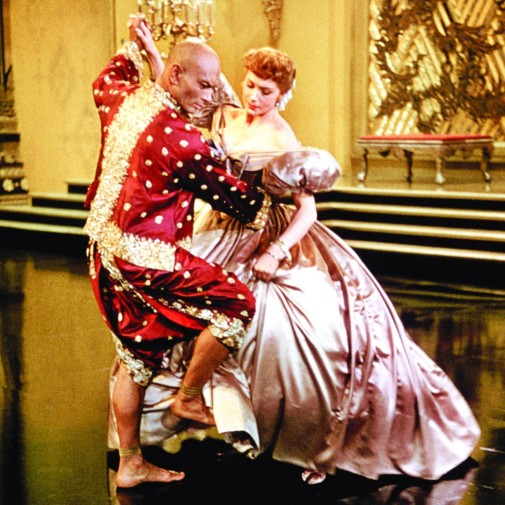
THE KING AND I (1956)
This classic musical may not diverge from the Orientalism that's permanently attached to this story, nor is it especially responsible history. However, I'd be lying if I stated this wasn't a compelling movie. It's overlong, weirdly structured, and the sets, no matter how grandiose they are, have a look of studio-bound airlessness to them. Oh, but it is gorgeous to behold, nonetheless. Irene Sharaff's ornate costumes fill the screen with mountains of opulent embroidery, rich silks, and some of the most gigantic hoop skirts ever seen. For as stagey as Walter Lang's direction can be, he knows how to overstuff the frame with enough bling to distract the eye.
Still, the stars make the picture and what stars they are. When translating the historical novel to the stage, Rodgers and Hammerstein supposedly pursued Rex Harrison. As he was unavailable, they cast young Yul Brynner as the King instead. He was a tremendous success and reprised the role on the movie adaptation, winning himself a deserved Best Actor Oscar (one of five the picture won). His performance is a blazing explosion of charisma that finds the humor in King Mongkut's person without falling into a mockery. More importantly, there's tender warmth to his paternal authority and a charge of sex in his interactions with the leading lady.
Since Gertrude Lawrence had died when this movie began production, someone else had to take on the role. The studio cast Deborah Kerr, who couldn't sing well enough and thus had to be dubbed by Marni Nixon. Hers isn't an incredibly complex performance, but the actress has terrific chemistry with Brynner. It turns out that electric spark between the two leads is all that's necessary to make The King and I into a fun, if problematic, movie event. The music also helps, as this is one of Rodgers and Hammerstein's most beautiful scores. When all these elements – music, costumes, stars – coalesce, The King and I is irresistible. In other words, the "Shall We Dance" number is pure effervescent, unexpectedly sexy, glamorous cinema.
The King and I is streaming on Fubo and DirecTV.
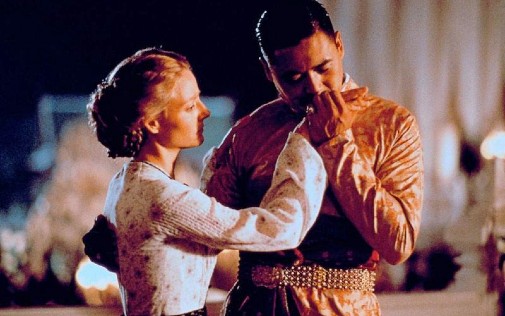
ANNA AND THE KING (1999)
It's hilarious to note how much Twentieth Century Fox tried to sell the most recent live-action version as the historically accurate one. That's an especially odd claim because, without even touching on the absurd action-heavy finale, this version is bizarrely insistent on reading the relationship between its title characters as romantic. While there was electricity between Kerr and Brynner, it never boiled over. 1999's Anna and the King outright claims, in voice-over narration, that Anna Leonowens was the love of King Mongkut's life. All that while Chow Yun-Fat and a curiously miscast Jodie Foster have very little romantic chemistry, mostly coming off as friends forced to play-act a forbidden love scenario.
But let's go back to that action-centered finale. In an attempt to give more agency to the Asian characters, screenwriters Steve Meerson and Peter Krikes and director Andy Tennant have invented an attempted military coup and accidentally bestowed Anna Leonowens with even more "white savior" qualities. As the movie shows, she's also a military prodigy, figuring out how to stop an armed uprising through pyrotechnics and a mighty tune. The way Anna and the King unravels into a wannabee David Lean epic on its last act is truly befuddling, not to mention incoherent.
Nonetheless, like all live-action big-screen versions of Anna Leonowens' life, Anna and the King was nominated for the Best Art Direction Oscar. Jenny Beavan's 1860s costumes were also recognized by the Academy, though her penchant for historical accuracy leaves little space for empty spectacle. Curiously enough, I'd say the picture's best elements are George Fenton's melodramatic score and Chinese superstar Bai Ling's performance as Tuptim. That being said, I might be cutting the film some slack since it has such nostalgic appeal to me. When I was young, it was always on TV for some reason, and I loved watching it.
Anna and the King is available to rent from most services.
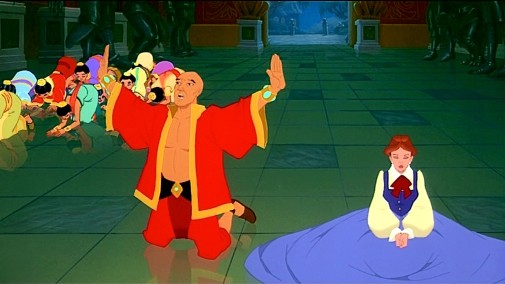
THE KING AND I (1999)
It's time for a confession. The main reason I wanted to write this piece was to introduce The Film Experience readership to one of the worst relics from my childhood. Anna and the King wasn't the only Anna Leonowens quasi-biopic to premiere on international cinemas in 1999. There was also this animated fature. Adapted from the Rodgers and Hammerstein musical, it remains the only cartoon produced by Morgan Creek Entertainment, and it's easy to see why. Not only is the picture ugly as sin, but it's also an insanely derivative piece, more blatantly racist than any of the other movies based on Leonowen's life.
Just so you get how unhinged this movie is, let's describe the first scene. Through a magic mirror/gong, King Mongkut's diabolical Prime Minister spies on the ship carrying Anna Leonowens to Bangkok. With the assistance of a hapless sidekick that looks like a wartime caricature of Asian fools, the villain uses the cover of a mighty storm to summon traumatizing illusions. Out of the crashing waves and dark clouds, a fire-breathing sea serpent materializes, terrifying the shipmen. To calm her son and the kid's pet monkey, Anna sings "I Whistle a Happy Tune," thus banishing the evil politician's magical illusions.
That's just the first scene!
"A Puzzlement" is a slapstick showstopper in which the King guilelessly monologues while his pet panther tries to warn him of the accroaching hordes of moving statues. "Hello Young Lovers" serves as background music to the romance of Tuptim and the crown prince, here aged up into a kung-fu fighting hunk. Curiously enough, everything derails into action set pieces in the same vein as the other 1999 movie. Here, though, King Mongkut saves the day with the help of a hot air balloon. It's preposterous beyond words and so poorly animated it never becomes fun to watch.
The King and I is streaming on Amazon Prime Video, Starz, and DirecTV.
Which is your favorite big-screen retelling of Anna Leonowens' life in Siam?



Reader Comments (9)
As for the '46 version, I believe it was a big success. But I've always considered it a missed opportunity. After establishing herself as a dramatic actress in the early 30's, Irene Dunne soared to a whole new level when she revealed her amazing talent for comedy. What she does in films like "The Awful Truth", "My Favorite Wife" and "Together Again" never fails to delight me no matter how many times I revisit them. I'm less fond of her in drama, where she's fully competent but sometimes no more than that. That's where I'd place her work in "Anna and the King of Siam".
I've always thought there was an opportunity for absolutely perfect casting of this role exactly when this film was made. Fox went all the way to England for their King. But I never thought Rex Harrison was the right choice (for some of the reasons you've already elucidated). Harrison had recently had a big hit in Britain with the film "I Live in Grosvenor Square" and Fox execs were apparently impressed enough to offer him the King role in "Anna". What's always astounded me was that they lit on him rather than the star he was teamed with in "Grosvenor". That would be the wonderful Anna Neagle. If you've ever seen her work, you know she's the perfect embodiment of Anna. And that's not even counting the rather cosmically coincidental fact that her real world name was Anna. Neagle's charm, beauty and talent had established her as a top-line box office star in Britain (#1 several times). She's the one whose essence really carries "I Live in Grosvenor Square" to whatever distinction it has. Plus she was already a known quantity in America, having headlined a number of Hollywood films for RKO a few years earlier. Yet somehow Fox looked right past her to get to Harrison. For me, the perfect 1946 "Anna and the King of Siam" would have starred Neagle and Anthony Quinn, who'd have been a pretty marvelous King, I think. That's still the version that plays in my head.
As for the 50's musical , it's definitely entertaining - and of course the songs are incredible. I still think the film's high point, though, remains the amazing "Small House of Uncle Thomas" number, realized to perfection.
Some of your readers probably know that Dorothy Dandridge was offered the Tuptim role in that version and turned it down, a decision she later regretted. And Maureen O'Hara came within a whisper of being signed to play Mrs. Anna. I think she'd have struck some impressive sparks with Brynner. And - unlike Kerr (who, of course, is fine) O'Hara was an accomplished singer and wouldn't have needed any help from Marni Nixon.
I like the first version which is more muted than the Brynner/Kerr musical but has some nice parts. I agree that Rex's reading of the part is somewhat off but Irene Dunne balances him out. I realize that all three are not the proper ethnicity, such a commonplace occurrence in Golden Age films that if I let it bother me it would ruin practically every other picture made at the time, but I love the performances of Lee J. Cobb, Gale Sondergaard and Linda Darnell. Linda's Tuptim's fate is very different from Rita Moreno's in the later version. She was actually burned slightly during her final scene which caused an extreme fear of fire from that time on, she had a clause in her contract that no character she played from that point could perish in a fire. A terrible irony since that was to be her fate.
As enjoyable as the 40's version is it pales in comparison to the 50's one which despite whatever problems it might have with overlength, pacing etc. is a joyous piece of eye candy with by far the best match-up of leads. That's such a key ingredient.
I've stayed away from the Jodie Foster film, even the previews look stodgy and any feedback I've ever heard is that it's a beautiful looking bore.
That cartoon looks and sounds horrendous.
I saw the stage version almost two decades ago now at the London Palladium with Jason Scott Lee and Elaine Paige essaying the leads and it and they were marvelous. They didn't share quite the same chemistry that Yul and Deborah did but there was a definite underlying charge to their partnership which added the necessary spark to the show.
The Rogers and Hammerstein Encyclopedia states in its casting history of the initial run of the Broadway production of The King and I, producers seriously considered Rex Harrison, Alfred Drake and Noël Coward. When none of the three worked out, Yul Brynner was cast. He won the featured actor Tony since he was billed beneath the title. Only those performers with their names above the title can complete for the lead Tony.
When it came time to adapt the musical to film, producers first choice to play the King was Marlon Brando. When negotiations with Brando went awry, the producers went hat in hand to Brynner to recreate his stage triumph. Brynner used Brando’s rejection to negotiate a rich fee, both script and casting approval, and a hefty percentage of the film’s profits. Producers were seriously considering Dinah Shore who replaced Gertrude Lawrence on Broadway after her cancer prevented her continuing and Maureen O’Hara. It was Brynner who insisted on Deborah Kerr to play Anna.
I was lucky enough to catch the 1956 version at the Berlin Film Festival in a restored print in 70 millimeter wide screen. It was fabulous! The film was so gloriously opulent, and you could see every cent they had spent right up there on the screen. Up until then I had considered it just a meh musical (I had only seen it on tv). Since then, it's been one of my favorite musicals - I also have a couple recordings, weird and fraudulent sexual and cultural politics and all.
Manna and the King of TFE. Claudio we bow down. We are not worthy.
It has to be ‘The King and I’, which is almost perfect even with its historical inaccuracies. Yul Brynner and Deborah Kerr were the right choices for their time, Maureen O’Hara would not have been a good fit. I think Dunne was rather dull in the ‘46 version, and Rex Harrison was an odd choice. The suggestion of Anna Neagle is a good one and teamed with Anthony Quinn makes me think this is a film that should have been made. I’ve avoided the Jodie Foster version, and Cláudio’s article makes me think I’ve made the right decision.
The 56 version is the best- perfect cast and gorgeous production- the animated movie is hysterical - hey you forgot to mention the tv series
The biggest joke about all these films is the whitewashing of Anna Leonowens herself, whose maternal grandmother was presumably mixed-race (Anglo-Indian), a fact Leonowens herself took pains to conceal.
And she was the great-aunt of Anglo-Indian movie star Boris Karloff.
Yul winning Best Actor is one of the great wins of the category. How often does a lead actor win for a musical role and an Asian character at that?